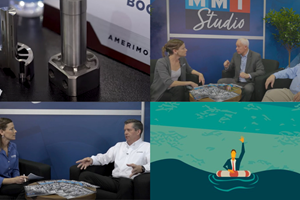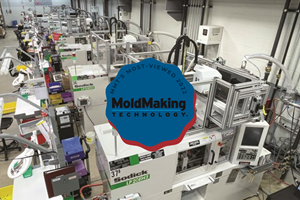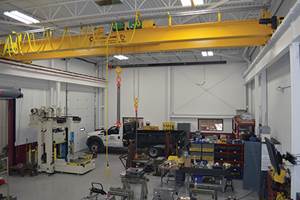Selling Your Shop
Mold shop owners need to create financial plans ahead of time when selling their company.
Owning your own business can be a dream come true, but often, small business owners may sell their companies for a variety of reasons. Whether the sale is planned or unexpected, it is very important to think about this process earlier rather than later. There are a number of factors to consider when deciding to sell your closely held business.
- A big part of the sale process involves planning and advice. It is important to surround yourself with an experienced team of professionals who can assist you in the complex activities associated with the sale. Most likely, you will be working with your attorney on the legal structure of the transaction and with your accountant on the tax consequences of the sale. Also, you may want to work with a business valuation expert who can help to establish an asking price and evaluate any offers you may receive. In some cases, you may find advice from a small business investment banker helpful. He or she may be able to identify potential buyers and prepare the business for the sale. Also, you should work with your financial consultant who can help you understand the effects of the sale on your personal financial situation and create a plan for building a properly diversified investment portfolio from the sale proceeds. You should look for a financial consultant that has taken the time to get additional credentials, such as Certified Financial Planner (CFP), Accredited Asset Management Specialist (AAMS) or Retirement Planning Specialist (RPS). You need to trust the person you are working with. Relationships are very important when it comes to situations like these. Each of these professionals will bring different skills to the table in order to deal with a variety of sale issues.
- A comprehensive financial plan can help you see where you stand financially and determine how much capital you may need to replace the income you are currently receiving from your business. A comprehensive financial plan will cover items such as the titling of assets, trusts, wills, living wills, durable power of attorney, beneficiary designations, gifting techniques, estate tax liability and long-term care. By knowing how much capital you need to replace your income, it may help you determine what the asking price should be for your business. Your financial consultant can help you understand how much income you can realistically expect to generate from the proceeds of the sale and what might be the most appropriate way to invest the proceeds. You'll want to have a plan together early on so that your money can begin working for you as soon as possible.
- There may be some assets in the business that can be used more effectively. Many businesses own substantial life insurance policies on key employees. If the business is sold, you should look into what the best thing is to do with those policies. You may not need the same amount of life insurance after the sale. A financial consultant can help you define your objectives, evaluate the existing policies and identify the most appropriate strategy for dealing with these assets.
Many times businesses have large amounts of cash sitting idle. There are ways to potentially increase the amount of your cash reserves by earning more attractive yields. Although the market value of the cash alternatives fluctuate and may be worth more or less than your original investment when redeemed, the benefits of higher yields can be worth the risk. It also can be structured to meet your liquid cash needs without leaving interest revenue on the table.
- If your business offers a qualified retirement plan, you may want to take a look at what you will do with your portion of the plan. Some business owners choose to leave their account in the company plan, but there may be advantages to "rolling" over the funds in their retirement plan into an IRA for future use. A direct rollover is simple and will avoid a 20 percent withholding penalty to the IRS. It allows the assets to retain their tax-deferred growth potential. Your investment selection is not limited to the funds that are available in the 401(k). If structured properly, penalty-free withdrawals can be made prior to age fifty-nine. So when it becomes time to distribute the assets to your beneficiaries, an IRA will provide better distribution options. Leaving your assets in the company plan can provide you with protection under the Employee Retirement Income Security Act (ERISA), which keeps creditors from seizing your retirement savings. Although not covered by the ERISA, IRAs may be protected from creditors under your state laws. You also may be able to repay any outstanding loans that you have in the plan.
The way you handle the sale of your business can have a huge impact on your quality of life in the future. By involving professionals early and taking the right steps, you'll be in a better position to meet your objectives.
Related Content
From Injection Mold Venting to Runnerless Micro Molds: MMT's Top-Viewed June Content
The MoldMaking Technology team has compiled a list of the top-viewed June content based on analytics. This month, we covered an array of topics including injection mold venting, business strategies and runnerless micro molds. Take a look at what you might have missed!
Read MoreTransforming Moldmaking into Digital Industrial Manufacturing
Moldmaking and digitalization is at the core of this global industrial manufacturing company’s consolidation and diversification plan.
Read MoreMold Builder Uses Counter-Intuitive Approach for Mold Challenges
Matrix Tool Inc. answers customers’ hard questions with creative solutions for cavity spacing, tool sizing, runner layout and melt delivery that reveal the benefits of running in a smaller press size at lower cavitation but higher yield.
Read MoreThe Trifecta of Competitive Toolmaking
Process, technology and people form the foundations of the business philosophy in place at Eifel Mold & Engineering.
Read MoreRead Next
Are You a Moldmaker Considering 3D Printing? Consider the 3D Printing Workshop at NPE2024
Presentations will cover 3D printing for mold tooling, material innovation, product development, bridge production and full-scale, high-volume additive manufacturing.
Read MoreHow to Use Strategic Planning Tools, Data to Manage the Human Side of Business
Q&A with Marion Wells, MMT EAB member and founder of Human Asset Management.
Read MoreReasons to Use Fiber Lasers for Mold Cleaning
Fiber lasers offer a simplicity, speed, control and portability, minimizing mold cleaning risks.
Read More












.jpg;maxWidth=300;quality=90)









